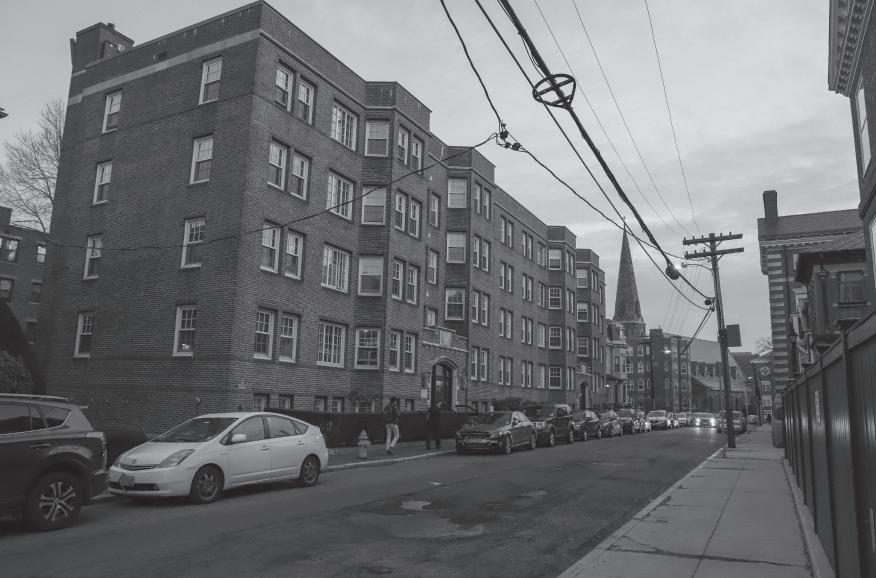The Harvard Crimson THE UNIVERSITY DAILY, EST. 1873 | VOLUME CXLVII, NO. 10 | CAMBRIDGE, MASSACHUSETTS | WEDNESDAY, FEBRUARY 5, 2019
EDITORIAL PAGE 4
NEWS PAGE 7
SPORTS PAGE 8
The end of Cambridge’s moratorium on cannabis permits is disappointing
Winthrop seeks replacements for its soon-to-depart interim faculty deans
Women’s Ice Hockey falls to Northeastern in Beanpot
Faculty Vote in Favor of Divestment, 179-20 HUPD to Start Internal Inquiry By JAMES S. BIKALES and KEVIN R. CHEN CRIMSON STAFF WRITERS
In a dramatic rebuke of administrators’ longstanding position on whether Harvard should invest in fossil fuels, the Faculty of Arts and Sciences voted overwhelmingly at its monthly meeting Tuesday to demand the Harvard Corporation divest the University’s endowment. The vote marks the culmination of a four-month-long debate in faculty meetings over the proper role of the University in combating climate change. Ultimately, 179 faculty members supported a motion in favor of divestment, while just 20 voted to oppose it. Faculty supporters who spoke at the meeting argued that Harvard should be at the forefront of an international divestment movement. English department chair Nicholas J. Watson presented the proposal, which suggested the faculty advise the Harvard Corporation — the University’s highest governing body — to instruct the Harvard Management Company to withdraw and no longer pursue investments in companies that “ex-
plore for or develop further reserves of fossil fuels.” The proposal also asks the Corporation to replace HMC investment advisers who are “unwilling or unable to comply” with the motion. The final motion that passed included an amendment introduced by English professor James T. Engell ’73, which added that all future endowment investments should be subjected to a “system of decarbonization.” The vote on the final measure was taken by paper ballot instead of verbally — an unusual move for a Faculty vote. Watson told faculty members before the vote that Harvard has become the “poster child” of the fossil fuel industry, and said the cumulative effect of his motion and Engell’s amendment could be “significant.” “Divesting is not only the right thing to do, it is the smart thing to do for the long term,” Watson said. Engell said while introducing his amendment that, even though the motion is “advisory only,” he hopes that it will
SEE DIVESTMENT PAGE 4
By EMA R. SCHUMER CRIMSON STAFF WRITER
scribes the relationship and coexistence of the non-academic — “town” — and academic — “gown” — populations in cities with university campuses. On Tuesday evening, Harvard presented its report along with MIT and Lesley University. Harvard’s director of planning services, Alexandra J. Offiong, gave an overview at the meeting of the University’s recent infrastructure projects, including the completed renovations of Lowell House, Robinson Hall, Schlesinger Library, and Gutman Library. She also updated the board on the new School of Engineering and Applied Sciences campus in Allston and shared progress reports on future projects like the planned renovation of Randolph Hall, Russell Hall, and Westmorly Court in Adams
Harvard University Police Department Chief Francis D. “Bud” Riley “will be moving forward in the near future” with an internal review of his department in response to a recent report of racism, sexism, and alleged favoritism, according to an email he sent to HUPD employees Tuesday night. The email, which was obtained by The Crimson, comes on the heels of a Crimson investigation that found repeated instances of racism and sexism in the department over the span of nearly three decades. In lawsuits, discrimination complaints, and interviews, 21 current and former HUPD employees alleged the department’s leadership favors certain officers and retaliates against those who come forth with concerns regarding the department’s climate. These employees accused Riley of being the source of a toxic culture within the department. In his email, Riley addressed The Crimson’s investigation and wrote that he will set in motion his own assessment of the department. “While the article relies on and reports on multiple incidents and lawsuits dating back many years, the overarching allegations of racism, sexism, and favoritism are serious,” the chief wrote. “Like every organization, within the HUPD, there are steps we can take to improve.” “I will be moving forward in the near future with efforts to evaluate our structure, processes and internal climate,” he added. “This includes reviewing and reminding all of us that we have clear and effective processes through which to both raise and address internal conflicts, misconduct or incidents in an appropriate and professional manner.” Riley invited members of the department to come forth with
SEE TOWN GOWN PAGE 5
SEE HUPD PAGE 5
Members of Harvard’s faculty walk into University Hall for their monthly meeting Tuesday afternoon.
JONATHAN
G. YUAN—CRIMSON PHOTOGRAPHER
Harvard Presents Town Gown Report By CHARLES XU CRIMSON STAFF WRITER
Harvard presented its infrastructure projects, sustainability initiatives, and neighborhood engagement initiatives to the Cambridge Planning Board at the annual Town Gown report meeting Tuesday. The Town Gown meeting is an opportunity for the planning board to conduct an “annual joint review of university and community needs and plans,” according to the Cambridge municipal website. Each year, universities in Cambridge, including Harvard, are required to submit a report to the Community Development Department outlining their recent projects and future plans. These institutions typically present their Town Gown reports to the Planning Board in early February. The term “town gown” de
CAMILLE G. CALDERA—CRIMSON DESIGNER
Parties Cross-Motion Historical Apthorp House to See Delay in Renewal in Negligence Suit By SYDNIE M. COBB and DECLAN J. KNIERIEM CRIMSON STAFF WRITERS
By JULIET E. ISSELBACHER and AMANDA Y. SU CRIMSON STAFF WRITERS
Harvard and the plaintiff in a 2018 wrongful death lawsuit filed dueling motions over whether a set of University documents and other materials will be subject to discovery on Jan. 27. The suit alleges that the University and some of its employees were negligent in their care of a Harvard undergraduate, Luke Z. Tang ’18, who died by suicide in September 2015. Wendell W. Tang — Luke’s father — filed the suit on behalf of his son in September 2018. Harvard’s proposed protective order would designate certain “sensitive” discovery materials in the litigation to safeguard them from being used for “any ulterior or unauthorized purpose.” The materials at issue include student and personnel records, as well as “non-public materials about the approaches Harvard takes to prevent student suicides” and “internal, non-public policies and proce
INSIDE THIS ISSUE
Harvard Today 2
dures relating to safety, security, and residential life,” according to Harvard’s motion. “The proposed protective order contains the most fundamental safeguard in any litigation for all discovery produced—that discovery may be used for only for the purpose of the litigation and not for any ulterior or unauthorized purpose,” Harvard’s lawyers wrote. In response, Wendell Tang’s lawyers argued that the University is attempting to “preemptively” keep discovery materials confidential and impose an unfair burden of proof on the plaintiff. Wendell Tang’s motion further alleges that Harvard’s proposed sealing of documents would violate Massachusetts law, which they argue supports the disclosure of information which may be in the public interest. “Harvard wants to limit public access, including to parents of students whom they are sending away from home for the
SEE SUIT PAGE 3
News 3
Editorial 6
Apthorp House, which has served as Adams House’s faculty dean residence since 1931, anticipates at least a six month delay in the reopening of the building. Apthorp’s restoration was originally slated to begin in summer 2020, with the building’s reopening slated for August 2021. According to Adams House Faculty Dean John G. “Sean” Palfrey ’67, the opening has now been rescheduled to early 2022 because of the significant changes planned for the 260-year-old building. Palfrey said Apthorp House’s heating system will undergo some much-needed changes. He also explained that the added renovation time will ensure that issues like “minor cracks in the foundation” of the building can be properly addressed. “During the 21 years we were in Apthorp, the ceiling fell in four or five times because the steam and the moisture gets into the walls and ceilings and destroys the plaster and then
SEE APTHORP PAGE 4
Sports 8
Apthorp is a historical building in Adams House and is currently in the process of being restored..
JENNY M. LU —
CRIMSON PHOTOGRAPHER
TODAY’S FORECAST
CLOUDY High: 41 Low: 28
VISIT THECRIMSON.COM. FOLLOW @THECRIMSON ON TWITTER.
grandmaster




